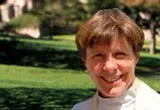Whoever Is Not Against Us Is For Us

Joyce Tompkins is the Religious Advisor to the Campus Protestant Community. Other Spiritual Reflections are available on the Religious Advisor's page.
You can write to Joyce at jtompki1@swarthmore.edu
The other day I was shopping at B.J's. For those of you who don't know, B.J.'s is one of the big warehouse stores, where you buy everything in bulk: 2 quart-jars of peanut butter; gallon bottles of apple juice; 16 cans of Spaghettios. You can save a good deal of money buying this way, if your family is able to consume food in such large quantities. When my kids were younger I did most of my shopping there. Now, I only visit once a month to get drinks and candy bars for the campus ministry.
I don't recall ever seeing any one I know at B.J.'s. On this last visit I had picked out the fifteen items I needed (too many for the express lane) and was waiting in a very long checkout line. Looking around, I meditated on the diversity of the clientele. There was no one who looked much like me. The woman ahead of me, heavily pregnant and barking at three small children, pushed a cart that overflowed with sugary cereals and microwavable dinners. Behind me, with a load of frozen hors d'oeuvres, were two men who had so many tattoos their skin color appeared to be blue. In the next lane was a family of Africans wearing colorful headgear and speaking to one another in their native dialect. Behind them was a very heavy woman in a motorized chair carrying multiple boxes of sugar-free candy. I felt like I was from Mars.
Then, as I stood there in my isolation, I overheard the tattooed men talking behind me. They were talking about a wedding. One of them seemed to be the groom, and the other the best man. I turned a bit toward them, listening. Together they were fussing about how many frozen mini quiches would be enough for the reception on Saturday. The tattooed groom confessed to being nervous. I smiled to myself. This was familiar territory. So, I leaned over their cart and said: "Congratulations! I heard you say you're getting married!" The two men beamed at me, the groom gushing forth information about his beautiful bride, the best man asking my opinion about the mini quiches.
As I helped count the boxes in their cart, the woman in the chair motored over, losing her place in line, to offer her opinion. In a few minutes everyone - the tattooed men, the African family (who spoke very good English), the harried pregnant mother, the woman in the electric chair, and a teenager with multiple piercings from the next line over - were all happily helping to plan the wedding reception. So engrossed were we that we all forgot we were in a checkout line, and the clerks had to leave their cash registers to come back into the line and move us along. Not before venturing their own opinions on the number of mini quiches needed, of course.
When I left BJ's more than 30 minutes later, melted ice cream dripping from my cart, I gave the groom, Sam, my blessing and waved goodbye to my new friends. All the way home I reflected, smiling, on this episode. It is so appropriate for week of World Communion Sunday. How easily I had focused first on what separated me from other people: surface things like tattoos and language, costume and disability and food choices. How easily I might have left the store that day with no idea how much I had in common with these people, people with families and dreams and hungers just like mine. How easily one small statement of recognition and friendly humanity had brought us together. Just a word, a smile, and we were all members of the wedding.
"Whoever is not against us is for us," says Jesus in Mark's gospel, when his disciples are suspicious of an outsider doing good works in his name. It's the flip side of another statement I've heard lately in the political rhetoric: "Whoever is not with us is against us." It's only a slight shift in word order - and yet the emphasis has been completely reversed. Which will be our default position? Are we most naturally enemies, different and separate from one another? Or, are we more naturally friends, united in our common humanity? It is fear that breeds the former: dividing us into smaller and smaller units, narrower and narrower interest groups, and leading finally to the desperate cry: "Every man for himself!" And it is hope that fosters the latter: searching with an eager smile for common ground. Hope, or fear? Which will we choose? I wonder....
Joyce Tompkins
World Communion Sunday, 2006
Yom Kippur, 2006
Ramadan, 2006



